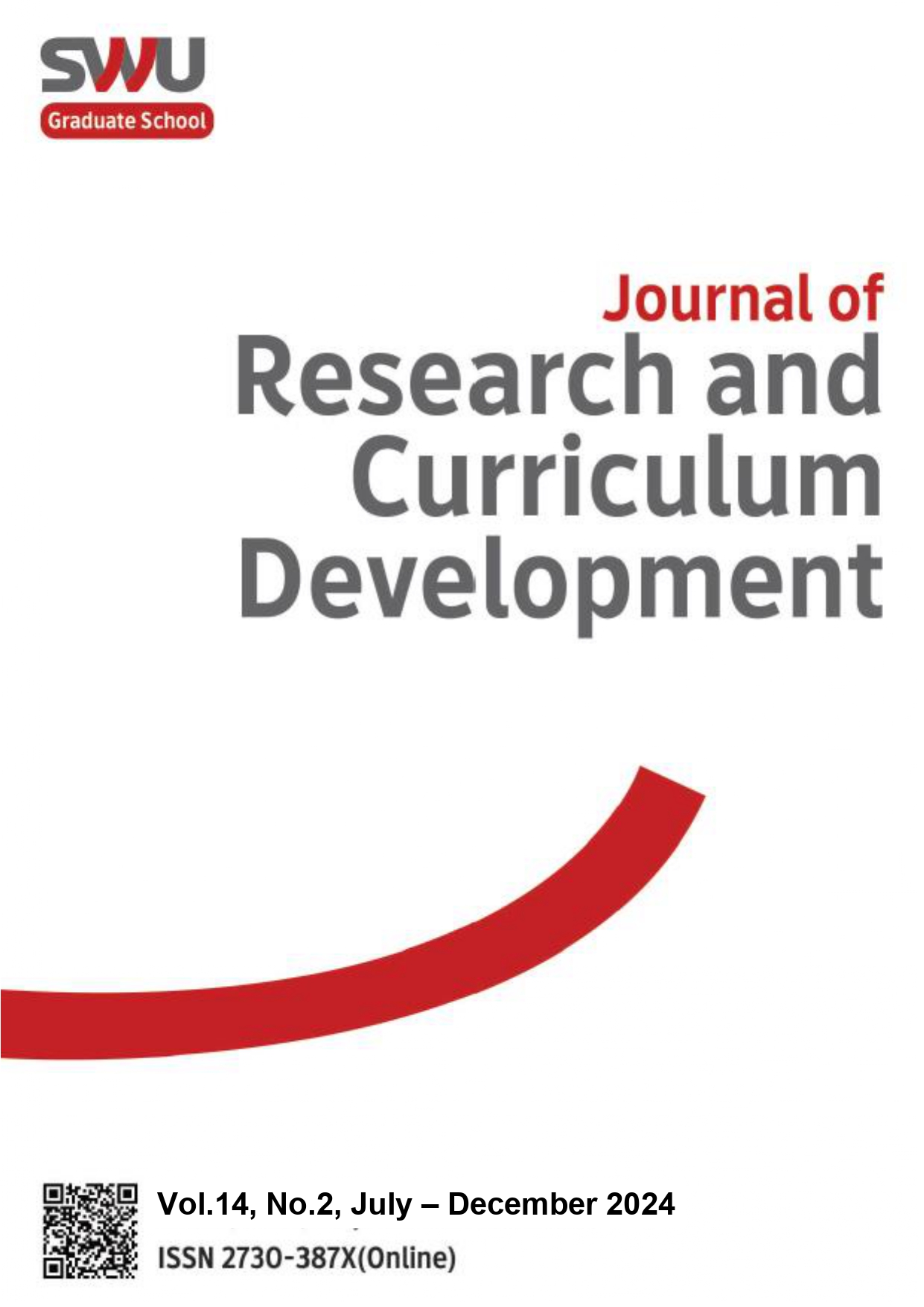The Effectiveness of Using Differentiated Instruction on Science Learning Achievement for Grade 5 Bhutanese Students
Keywords:
Differentiated instruction, Learning achievement, Learning satisfaction, ScienceAbstract
The purposes of the study were to examine the effectiveness of using Differentiated Instruction (DI) on Science learning achievement and learning satisfaction of grade 5 Bhutanese Students. This mixed- method research adopted a cluster random sampling method to select a sample group consisting of 30 students from one of the primary schools in Bhutan. The instruments used for the study were lesson plans, learning achievement tests and a semi-structured interview. The validity of the research instruments were validated by 3 experts with the result of the IOC index ranges from -1 to +1. The study used pre-test and post-test method to collect quantitative data and semi-structured interview to collect qualitative data. The pre-test and post-test were conducted before and after the treatment to find out the level of students’ learning achievement. The semi-structured interview was administered after the post-test to find out the students’ learning satisfaction in Science. The result of learning achievement was analyzed using a paired sample t-test. It was found that the post-test mean score (14.37) was higher than the pre-test mean score (8.58) with the mean difference of 5.79. Further, the significance (p) value was .01 which indicated using differentiated instruction on Science learning was effective. Additionally, the findings from semi-structured interview concluded that participants expressed high levels of learning satisfaction. Therefore, DI approach should be applied and implemented in schools as it creates new and diverse learning environments to accommodate students’ diverse learning requirements, irrespective of their academic status or standing in society.
References
Abutayeh, K. (2022). Jordanian Science Teachers’ Perspectives on Obstacles of Differentiated Instruction. ilkogretim Elementary Education Online, 20(2), 67-73. doi:10.17051/ilkonline.2021.02.12
Alsalhi, N. R., Abdelrahman, R., Abdelkader, A. F.I., AI-Yatim, S.S., Habboush, M., & Qawasmi, A.A. (2021). Impact of using the differentiated instruction (DI) strategy on student achievement in an intermediate stage science course. International Journal of Emerging Technologies in Learning (iJET).16 (11). doi:10.3991/ijet.v16i11.22303
Alt, V. L., & Pozas, M. (2023). Differentiated instruction around the world: A Global Inclusive Sight. Humboldt-Universität zu Berlin, Professional School of Education. doi: 10.31244/9783830997023
Bhutan Baccalaureate (BB). (2021). Druk Gyalpo’s Institute. Retrieved from https://dgi.edu.bt/
Bhutan Council for School Examination and Assessment. (2019). Education in Bhutan: findings from Bhutan’s experience in PISA for Development. Retrieved from earningportal.iiep.unesco.org/en/library/education-in-bhutan-findings-from-bhutans experience-in-pisa-for-development#:~:text=Bhutanese%2015-year-olds%20performed,and%2045.1%25%20in%20scientific%20literacy.
Dorji, K., Jatsho, S., & Choden, P. (2022). Issues of Bhutanese Science Education: A view from the exploratory study. RABSEL: the CERD Educational Journal, 22(2), 1-21. http//doi.org/10.17102/rabsel.22.2.5
Dovetail Editorial Team. (2023). What is semi-structured interview? Retrieved from https://dovetail.com/research/semi-structured-interview/
Doyle, L., Brady, A. M., & Byrne, G. (2009). An overview of mix-method research. Journal of Research in Nursing, 14 (2), 175–185. doi:10.1177/ 1744987108093962
George, T. (2023, June 22). Semi-structured interview/ Definition, Guide & Examples. Scibber.Retrieved from https://www.scribbr.com/methodology/semi-structured interview/
Gheyssens, E., Struyven, K., & Freixenet, J. G. (2023). Differentiated Instruction as an Approach to Establish Effective Teaching in Inclusive Classrooms. Effective teaching around the world. https://doi.org/10.1007/978-3-031-31678-4_30
Jacobs, A. E. S., Meijar, A., Lorenz, M. H., & Maulana, R. (2019). Differentiated Instruction In Secondary Education: A Systemic Review of Research Evidence. Frontiers in Psychology, 10, 2366. https:// doi.org/10.3389/fpsyg.2019.02366
Kado, Dorji, N., Dem, N., & Om, D. (2021). The effect of differentiated instruction on academic achievement of grade eleven students in the field of derivative in Bhutan. International Journal of Social Sciences and Educational Studies, 2(1), 27-34. doi:10.53402/ijesss. v2i1.37
Katel, N. (2024). More Board Exams and the growing academic pressure on Bhutanese students. Retrieved from https://x.com/thebhutanese/status/1749354310134280338
Loreman, T. (2017). Pedagogy for Inclusive Education. Oxford Research Encyclope‐ dias. https://doi.org/10.1093/ acrefore/9780190264093.013.148
Magableh, I. S. I., & Abdullah, A. (2020). Effectiveness of Differentiated Instruction on Primary School Students’ English Reading Comprehension Achievement. International Journal of Learning, Teaching and Educational Research, 19(3), 20-35. https://doi.org/10.26803/ijlter.19.3.2
Middleton, F. (2023). Reliability vs Validity in Research/ Differences, types and Examples. Scriber. Retrieved from https://www.scribbr.com/methodology/reliability-vs-validity/
Ministry of Education. (2014). Bhutan education blueprint 2014-2024. Ministry of Education, Bhutan: Author.
Nair, S. S., & Prem, S.S. (2020). A Framework for Mixed-method Research. Shanlax International Journal of Management, 8(2), 45-53. https://doi.org/10.34293/ management. v8i2.3220
National Statistical Bureau. (2023). Statistical yearbook of Bhutan 2023. Bhutan: Author.
Rabgay, T. (2018). Patters of Teacher-student verbal interaction in the tenth-grade biology class,
Rabgay, T. (2021). Action Research in Bhutan: Factors Influencing Bhutanese Secondary scienceTeachers’CollaborativeEfforts(Mater’sthesis).Retrievedfromhttps://www.researchgate.net/publication/355940463_Action_Research_in_Bhutan_Factors_Influencing_Bhutanese_Secondary_Science_Teachers%27_Collaborative_Efforts
Royal Education Council. (2016). Complete Bhutan National School Curriculum Conference 2016 report. Bhutan: Author.
Royal Education Council. (2019). Needs assessment on the differentiated curriculum in science and mathematics. Bhutan: Author.
Scarparolo, G., & Subban, P. (2023). Differentiation and differentiated instruction: A philosophy and pedagogical approach to inclusive teaching and responsive, effective instruction.Retrievedfromhttps;//api.researchrepository.uwa.edu.au/ws/portal/276018240/Differentiated instruction around the world 2023.pdf
Subban, P. (2006). Differentiated instruction: A research basis. International Educational Journal, 7(7), 935-947.
Toledo, F. L. (2023). Differentiated instruction for enhanced Students’ Academic Performance in Science 10 (Physics). International Journal of Multidisciplinary:Applied Business and Education Research, 4(8), 2830-2846. http://dx.doi.org/10.11594/ijmaber.04.08.21
Tomlinson, C. A. (2001). How to differentiate instruction in mixed-ability classrooms. Retrieved from https://rutamaestra.santillana.com.co/wp-content/uploads/2020/01/classrooms-2nd-Edition-By-Carol-Ann-Tomlinson.pdf
Tomlinson, C. A. (2014). The differentiated classroom; Responding to the needs of all learners. Retrieved from https://rutamaestra.santillana.com.co/wp-content/uploads/
/01/The-Differentaited-Classroom-Responding-to-the-Needs.pdf
Tulbure, C. (2011). Differentiate instruction for preservice teachers: An experimental investigation. Procedia—Social and Behavioral Sciences, 30, 448-452. https://doi.org/10.1016/j.sbspro.2011.10.088
Utha,K., Giri, K., Gurung, B., Giri, N., Krogh, L., Keller, H. D., Willert, S., & Keller,K. D. (2016). Quality of school education in Bhutan: Case studies in the perspective of Gross National Happiness and assessment practices. Retrieved from https://vbn.aau.dk/
Downloads
Published
How to Cite
Issue
Section
License

This work is licensed under a Creative Commons Attribution-NonCommercial-NoDerivatives 4.0 International License.





